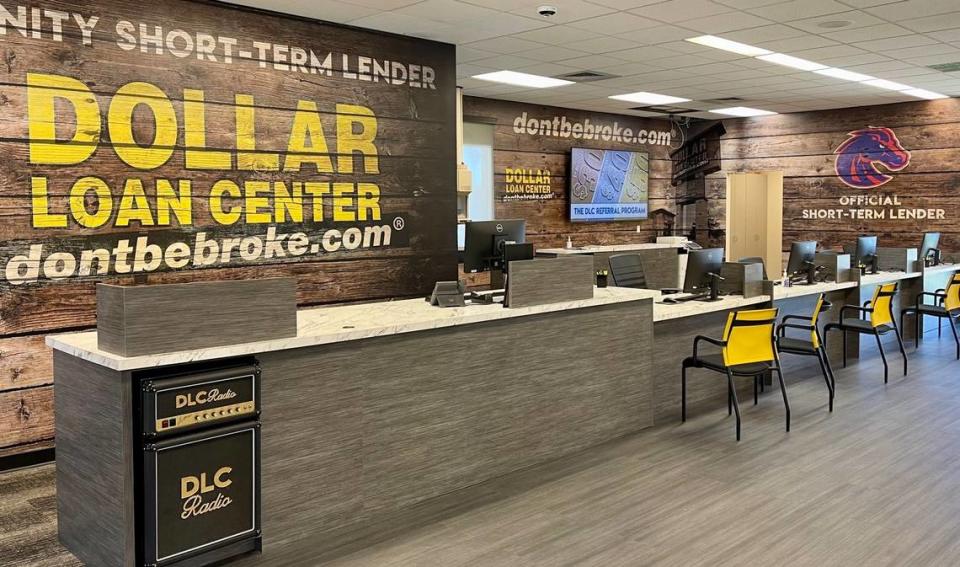For the sake of its students, Boise State should cut ties with payday lender | Opinion
Dollar Loan Center, a Las Vegas-based payday lender trying to gain a foothold in Idaho, is now “the official short-term lender of the Broncos.”
“Short-term lender” is the euphemism for payday lenders, those that front customers cash until their next payday.
For the sake of its students and its image, Boise State should cut ties with Dollar Loan Center. It never should have gotten into bed with that kind of business in the first place.
In response to the Idaho Statesman’s questions about the partnership, a Boise State official said Thursday that the Office of General Counsel is looking into the matter.
“An employee failed to conduct the due diligence expected by the university and failed to consult with critical decision makers when assessing this agreement,” according to an emailed statement. “Boise State takes very seriously its responsibility to our community and to our students and their well-being. The university is committed to ensuring that the companies and organizations with which we associate act in ways that are consistent with our values.”
This is nothing against Dollar Loan Center specifically. We just don’t think Boise State should be a partner with any part of the predatory payday loan industry, which preys on the most vulnerable and desperate, and charges exorbitant interest rates and fees while doing so.
This is a university whose students are likely taking on debt to attend school, working while taking classes and struggling to make ends meet. Boise State shouldn’t be partnering with a company that seeks to exploit those very students — or its many sports fans — who may be having financial woes.
To be fair, the argument in defense of short-term or payday lenders is that some people have nowhere else to turn to get money when they find themselves short and need to buy necessities or have an emergency expense, such as a car repair.
Payday lenders help to bridge the gap between running out of money and the next paycheck, a service not provided by traditional banks, credit unions or other financial institutions. They help people with an immediate need, so the argument goes, who might have bad credit scores, no bank account or no access to a credit card.
But many argue, and we agree, that payday lenders end up taking advantage of that desperation, charging exorbitant interest rates.
Payday lender rates
A typical payday loan has an annual percentage rate of just under 400%, according to the Center for Responsible Lending. According to the center’s most recent study in each state, the average payday lender interest rate in Idaho was 475%.
Further, the Consumer Financial Protection Bureau, a federal government agency, found that payday lenders collect 75% of their fees from borrowers with more than 10 loans per year, demonstrating that their business model is dependent on a long-term cycle of debt, according to the center.
And payday lenders are increasingly targeting young people and students, who can easily struggle to make ends meet.
According to a 2019 Center for American Progress article titled, “Young People Are Payday Lenders’ Newest Prey,” there are roughly 23,000 payday lenders across the country, nearly twice the number of McDonald’s restaurants. While only about 6% of adult Americans have used payday lending in the past five years, the majority of those borrowers are 18 to 24 years old, according to the article.
In addition, a recent University of Houston Law Center study showed that the payday lending industry often targets Black and Latino communities in advertising their products.
The proliferation of payday lenders became so acute at one point that the city of Caldwell in 2013 passed an ordinance regulating them, requiring them to get a special-use permit if seeking to open a storefront in a populated area.
The problem got so bad that even the Idaho Legislature did something about it. In 2014, the Legislature passed a bill that lets borrowers set up a payment plan with payday lenders if they get behind, and blocks lenders from piling fees and interest onto the remaining balance if borrowers opt for the payment plan.
If Idaho’s legislators feel like they need to protect consumers, you know it must be bad.
The Center for Responsible Lending estimates that payday lenders soak about $4 billion in fees from their users.

Dollar Loan Center, which opened its first Idaho storefronts in Boise this week — including one just a couple of blocks from Albertsons Stadium — has locations in Nevada and Utah and lends online in Wisconsin and Oklahoma. It stopped doing business in South Dakota in 2016, after state legislators there recognized how big a problem payday lending was and capped interest on short-term loans at 36%, according to South Dakota Live.
Look, we get it: College athletics is nothing but a big business now, estimated to be a $16 billion industry. It takes money to compete and show that you belong in college football’s top division as the power conferences consolidate.
Smaller schools like Boise State, in a state that has a smaller population than the city of Houston, struggle to compete with the big schools that have bigger stadiums and better facilities, pay coaches more and are more attractive to the better athletes.
But in its quest to monetize everything, Boise State shouldn’t be making deals with companies that are thriving in an industry that preys on people, including its own students.
Statesman editorials are the unsigned opinion of the Idaho Statesman’s editorial board. Board members are opinion editor Scott McIntosh, opinion writer Bryan Clark, editor Chadd Cripe, newsroom editors Dana Oland and Jim Keyser and community members Mary Rohlfing and Patricia Nilsson.

